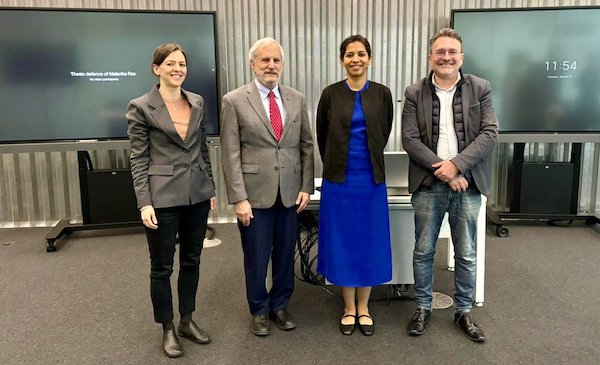How did you come to choose your research topic?
Initially, I aimed to write my doctoral thesis on international laws governing climate migration. However, during the first few months of my PhD, I realised that food security was a critical yet under-researched factor driving forced migration. Whether due to climate change or armed conflict, the need for food significantly influences why people flee. I also uncovered that food is often weaponised, used to torture or persecute individuals, which compels them to escape. This deliberate denial of food, rather than a general scarcity, highlighted an important area needing further exploration in international law.
Can you describe your thesis questions and your methodology?
My research revolves around two key questions:
- How does the principle of non-refoulement in international law apply to food-deprived forced migrants?
- What are the relevant areas and sources of international law to protect such persons against refoulement?
To tackle these questions, I conducted a doctrinal analysis of the principle of non-refoulement across international refugee law, human rights law, and humanitarian law, assessing whether food deprivation falls within its scope.
What are your major findings?
I found that various forms of food deprivation – such as famine, methods of torture, and warfare tactics – meet the threshold of risks that trigger the principle of non-refoulement. This means that non-refoulement can indeed protect those fleeing due to food deprivation. This finding underscores the universal application of the right to food, extending protection to forced migrants as well.
What could be the social and political implications of your thesis?
Food deprivation and forced migration are deeply interconnected issues with significant social and political implications. Hunger is often a key factor in forced migration journeys, while global hunger solutions must address the needs of vulnerable groups like forced migrants. My research suggests that the principle of non-refoulement can effectively address both issues, providing a legal framework to protect those fleeing hunger and promote comprehensive solutions to these intertwined challenges.
What are you doing now?
I am currently engaged in postdoctoral research at the Cambridge Centre for Environment, Energy, and Natural Resource Governance (C-EENRG) and affiliated with the Department of Land Economy at the University of Cambridge. Supported by the Swiss National Science Foundation (SNSF) Postdoc.Mobility Fellowship, my research focuses on international legal frameworks that regulate food flows and distribution. Additionally, I am a research affiliate at the Refugee Law Initiative (RLI) at the School of Advanced Study, University of London, where I continue to explore protections for individuals displaced by climate change, natural disasters, and conflict.
* * *

Malavika Rao (third from the left) defended her PhD thesis in International Law on 12 March 2024. Associate Professor Anne Saab (left) presided over the committee, which included Professor Vincent Chetail (right), Thesis Director, and, as External Reader, Professor T. Alexander Aleinikoff, The New School for Social Research, The New School, New York, USA.
Citation of the PhD thesis:
Rao, Malavika. “The Principle of Non-Refoulement for Food-Deprived Forced Migration.” PhD thesis, Graduate Institute of International and Development Studies, Geneva, 2024.
To access the PhD thesis, please contact Malavika Rao.
Banner image: Rolf G Wackenberg/Shutterstock.com.
Interview by Nathalie Tanner, Research Office.


